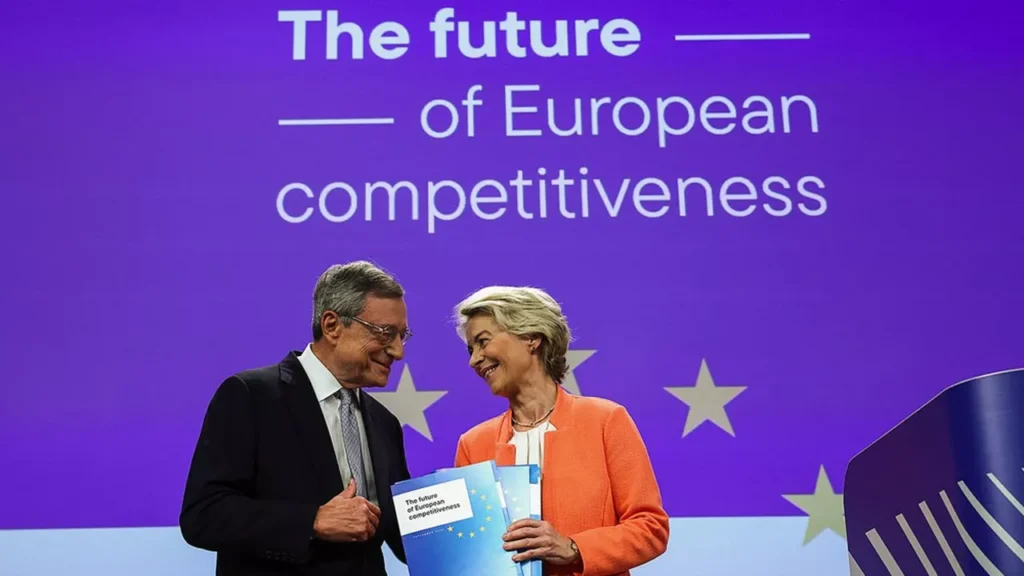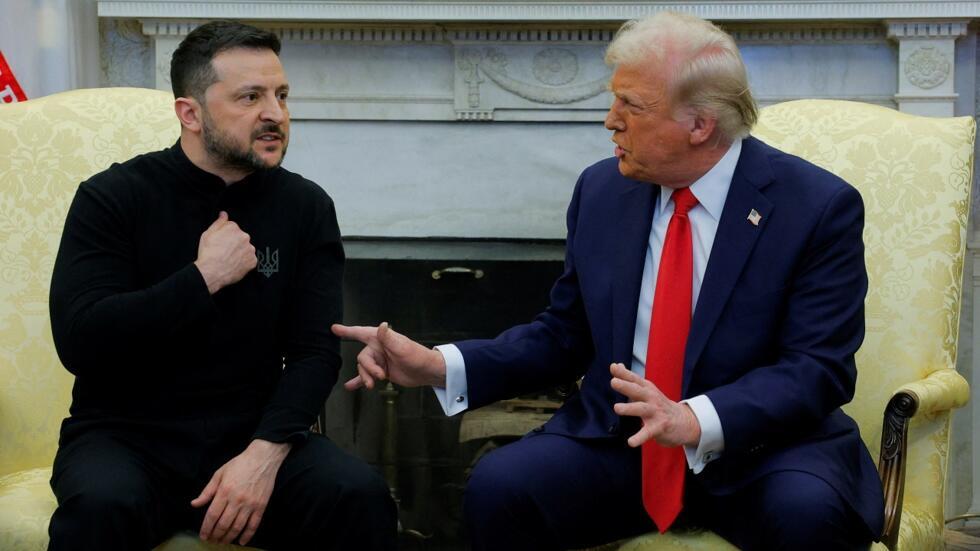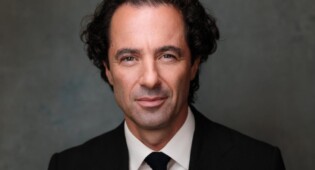
Analysis
Publié le : 14/03/2025
Olivier Schmitt: There is an emerging rift between the United States and European liberal democracies.
Thinking about the world to come. The war in Ukraine has likely opened an irreversible breach in the post-Cold War world order: the norms of international law are now being challenged not only by emerging countries but also by a global superpower.
To discuss this issue and explore the various paths available to a powerful Europe and transatlantic relations, the Newsroom welcomes Olivier Schmitt, Professor of Political Science, Director of Research at the Institute for Military Operations of the Royal Danish Defence College, and founding member of the Association for War and Strategy Studies. Author of several books, his research covers military strategy, defense policies, arms control, and far-right ideologies. Olivier Schmitt has also served at the University of Southern Denmark and the Institut des Hautes Études de Défense Nationale (IHEDN) in Paris.
The world of 1945 and that of 1989 are collapsing before our eyes. What geopolitical future for Europe in the face of this reshaping of alliances and the return of imperial impulses?
For Europe, the post-1945 reconstruction was carried out with American financial and security support. This was not free: the United States facilitated the reconstruction of Western Europe (through the Marshall Plan) with the intention of giving Europeans the means for their own defense. The initial idea was to be able to withdraw American troops from Europe, which never happened due to repeated European requests for concrete American commitment to NATO defense.
The post-Cold War period was marked by a historically exceptional convergence around the United States: roughly speaking, all the major powers were on the same side as the superpower. This made possible the period of “globalization,” where the progress of liberal democracy and capitalistic integration were thought to go hand in hand. This period was very comfortable for Europeans: since 1991, in real terms, the GDP of European countries has increased by 50%, and social spending by 100%, while military spending has remained stable (consequently, their relative share in GDP has decreased). European countries have thus accumulated an underinvestment in equipment of about 550 billion euros, or 4% of their wealth.
In the face of the historical rupture we are experiencing (whose magnitude is comparable to the fall of the USSR), Europeans have the choice between scaling up through a surge of integration or definitive vassalization due to their fragmentation.

A demonstration for a Marshall Plan in Germany, 1948 © World History Archives / ABACA Press.
We have been talking about Europe’s power for 10 years. Mario Draghi recently brought the subject back to the table, presenting his famous report on Europe’s competitiveness to Ursula von der Leyen. Would the long-awaited surge around this concept of power come rather from the assumed American withdrawal from the Russian-Ukrainian conflict? With what fundamentals?
One of the major economic advantages of the United States is the size of their consumer market and capital market, which allows for scaling up and distribution of products throughout the country, and raising substantial funding for promising companies. As noted in the Draghi report (but also the Letta report), within the Union, the so-called “single market” suffers from continued fragmentation: 24 different languages are a natural obstacle to cross-border trade, but the survival of many national barriers to intra-Union trade—such as different tax systems, regulated professions, or different national legislations—constitutes the most significant obstacle to growth. Logically, capital markets are also fragmented, limiting investment opportunities. In recent years, there has been a noticeable weariness towards the common market, with a marked slowdown in integration efforts. These must resume to strengthen the European internal market.

Mario Draghi submitted his report to the President of the European Commission, Ursula von der Leyen, on September 9, 2024. (Yves Herman/Reuters).
However, the political context is not conducive: the United Kingdom has left the EU; Germany has just experienced a change of government; France is in an electoral campaign; Italy has a fragile coalition. The European Commission is struggling to impose its priorities. In short, the political momentum is not there, and the European Union is struggling to position itself as a global player.
Today’s international order is dominated by the rule of ultra-force, where the rules-based order (respect for state sovereignty, punishment of war crimes, etc.) is fading because it is no longer defended by its founders: the West. In this context, does the “Global South”—or rather, the multiple Souths—not have an opportunity to impose a third way on the global chessboard?
Many so-called “Southern” countries actually benefit from this collapsing international order: they can reject the pressures for democratization, yet the greatest achievement of the post-Cold War international system has been to render wars of invasion illegitimate and illegal. This does not mean they have not occurred, but the awareness of violating an international norm does not make that norm nonexistent or even ineffective: criticism of the 2003 invasion of Iraq only makes sense within an international system where wars of aggression are condemned. If we enter an era that not only tolerates but encourages aggression, many countries have cause for concern.
Some have fantasized about a “multipolar” world. That world is now emerging, due to the growing normative rift between the United States and European liberal democracies. Unsurprisingly, this shift is particularly cruel for Europeans, who will pay a high price for their lack of integration and underinvestment in instruments of power. But it may also be perilous for many countries in the “Global South,” which may suddenly find themselves legitimate targets. A multipolar international system is always more conflict-prone than a unipolar or bipolar one.

Ukrainian President Volodymyr Zelensky (left) and U.S. President Donald Trump (right) had a heated exchange at the White House in Washington on Friday, February 28, 2025. REUTERS – Brian Snyder.
How would you define the Trump doctrine, beyond its reliance on transactionalism? Could it endure beyond his term in terms of strategic priorities?
The Trump doctrine is an amalgamation of far-right ideological currents with a shared goal: to fundamentally transform the functioning of the federal government and the United States’ relationship with the world. This amalgam consists of three main components.
First, there is the “intellectual” branch, represented by figures like JD Vance, drawing on anti-liberal thinkers (who view liberal democracy as a problem) such as Patrick Deneen, as well as proponents of techno-futurism, particularly its transhumanist strain, which seeks to “enhance” humanity through machines and artificial intelligence. This current includes figures like Peter Thiel and Curtis Yarvin (associated with the “Dark Enlightenment”). At its core, it expresses a deep hostility toward liberal democracy and an explicit desire to rank individuals based on their “competence.”
The second current is the libertarian-technofuturist branch, embodied by Elon Musk. This ideology combines hostility to the federal state with a belief in technological and industrial genius as the key to prosperity. It revives a long-standing American political myth, echoing figures like Vanderbilt, Rockefeller, and Carnegie—industrial magnates who built economic empires with minimal government interference.
The third current is the radical nationalist branch, represented by Steve Bannon. This movement leans toward white supremacist and fascist ideologies, though often veiled in pop culture references. This rhetorical strategy of “plausible deniability” (perfected by the alt-right) allows the movement to communicate messages that are well understood by its audience while simultaneously claiming to be victims of liberal “political correctness.”

Donald Trump (left) and James David Vance (right), at a rally during the 2024 U.S. presidential campaign. @Alex Wong / Getty.
These three ideological currents now form the core of the MAGA movement, which has taken control of the Republican Party. Given its deep structural influence, it is unlikely to disappear even if Trump leaves office.
In the event of an open conflict between China and the United States, how might Europe react? Does it need to choose a side?
This is a difficult question because much will depend on what happens in the coming months. Depending on American decisions, Europe could undergo a profound transformation in both its sources of security (if U.S. security guarantees disappear) and its sources of prosperity (due to tariffs and trade policies).
It is possible that China will extend a major commercial offer to Europe to offset American tariffs, which would, in effect, alter European interests.
It is still too early to provide a definitive answer, but it is clear that European interests are bound to evolve significantly.


